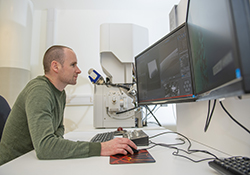WASC EPSRC Grant
WASC has recently been awarded £1m (EP/V007688/1)
Aim:
To facilitate enhanced access to Warwick-hosted experimental analytical science equipment to support research and postgraduate training; increasing multi-disciplinary collaboration and end user engagement; and serving as a beacon for analytical science nationally.
Objectives:
1. To improve collaborative and complementary working across the different facilities, infrastructures and platforms in a suite of state-of-the-art experimental equipment in twelve analytical science research areas hosted by the Departments of Chemistry, Engineering, Life Sciences and Physics at the University of Warwick that constitute the Warwick Analytical Science Centre (WASC).
2. To allow an increased focus on training (both in-person hands-on and the development of online courses) provided by research technical professionals (RTProfs) who are integral to deriving optimum benefit from substantial infrastructure investment, and who will be supported by networking across techniques and also regionally and nationally.
3. To serve as a regional centre of excellence for researchers at Midlands Universities, providing access for PhD students to specialised equipment and the associated expertise of the facility managers.
4. To champion nationally the key enabling importance of analytical science, linking the Warwick Centre for Doctoral Training in Analytical Science (AS-CDT) with opening up access to Warwick’s suite of analytical science infrastructure to UK analytical science PhD students.
5. To enhance and increase access by industry, both through collaborative PhD training and contract research via Warwick Scientific Services.
Deliverables:
1. Provide 480 days over four years of seed-corn use of the analytical science instrumentation (AS-I) at Warwick by PhD students at local Midlands Universities and nationally, analytical science PhD students, with access facilitated by a dedicated web portal.
2. Within Warwick, building from the five cohorts of eight students per year in the AS-CDT, and extending to the whole research community, provide statistics for the increased access by hundreds of researchers per year to the twelve AS-I areas.
3. Working with learned societies and related organisations and networks:
3A: For Research Technical Professionals (RTProfs), organise and host two national two-day meetings with 100 attendees across analytical science, as well as twelve national analytical science topic focused one-day meetings with 25 attendees.
3B. For PhD students, organise and host twelve national analytical science topic focused one-day meetings with 25 attendees.
4. Six meetings per year of the WASC management team, with representatives from six departments. One external advisory board annual meeting, with input from academia and industry.
Summary:
Access to analytical instrumentation lies at the heart of scientific progress; from the earliest days, with the availability of the first Dutch microscopes in the early 17th century, to the cutting edge of most advanced fields of contemporary science. The vast majority of advances and breakthroughs in knowledge are linked to the invention or improvement of analytical equipment and their availability both enables and sustains modern science and technology. Thus, it would not be possible to imagine chemistry without nuclear magnetic resonance spectroscopy, molecular biology without electron microscopy, or material science without X-ray diffraction.
The University of Warwick is one of the foremost centres for analytical science in the UK, with an internationally leading analytical equipment infrastructure underpinning an unrivalled spectrum of research areas, from functional materials (catalysts, polymers, composites, battery electrodes, photovoltaics, steels, nanoparticles, diamond and quantum materials)to biomedical research (pharmaceuticals, novel antimicrobials, detection of infectious agents, biologic cryopreservation, drug delivery, metabolism and ageing, and bacterial antibiotic resistance).
Warwick's philosophy in managing this unique set of facilities has been characterised by the drive to maximise its access for all researchers from undergraduate students to Professors, a commitment that is grounded in the University's Research Strategy. This has been achieved by organising the most advanced, state-of-the-art equipment into a range of university wide Research Technology Platforms (RTPs) and interdepartmental facilities available to both internal and external users. This unique model brings together experts and instrument developers with frequent or occasional end-users and has been the origin of a large number of highly successful collaborative research initiatives across the Departments of Chemistry, Engineering, Life Sciences and Physics, and with a number of other UK universities and industrial partners.
This proposal is aimed at sustaining and expanding the access to Warwick's analytical equipment infrastructure, with a particular focus towards supporting research and postgraduate training and, concurrently, expanding multi-disciplinary collaboration and end-user engagement. This will be achieved by investing in research technical professionals (RTProfs), who are integral to deriving optimum benefit from the existing substantial infrastructure investment. Their presence will represent an essential asset for the effective and consistent training, at the highest standards, of PhD students in the Midlands and across the UK and will provide them with over 480 days of seed-corn use of the analytical science instrumentation at Warwick. The RTProfs will also be responsible for showcasing the availability of funding for PhD students and for disseminating analytical science best practice, through the organisation of national analytical science meetings that will involve UK universities, learned societies, and industry.
This investment has an overarching vision to substantially promote analytical sciences to the UK, with Warwick playing a key role nationally as hub of excellence and a beacon for its development and practice.
|
To access the facilities if you are outside the scope of WASC: For our MI partners, you can access via TALENT: MI Technician-Led-Equipment-Sharing For Industry and other HEI easy access is available through: |
 |
We are working with the following external partners to deliver the objectives of this grant.
